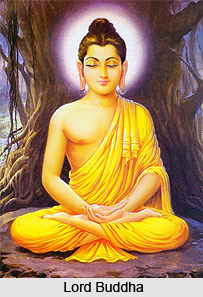 Non-Slandering is the last postulate in the Philosophy of Action which has been penned down in the Dhammapada. It has been said that slandering is one of the most dangerous sins. It has been said that one who wants to proceed over the path of salvation must get rid of slandering. One should not only refrain from slandering but at the same time he should also endure harsh words. Lord Buddha had expected such a kind of endurance from every-one. The Lord had said, "One should not be concerned with the misdeeds and negligence of others but his own misdeeds and negligence should be his concern". He had also said that a person who takes notice of the fault of others is ever irritable and his defilement goes on increasing. Not only that but also he reaches a state where he is far from the destruction of his defilement.
Non-Slandering is the last postulate in the Philosophy of Action which has been penned down in the Dhammapada. It has been said that slandering is one of the most dangerous sins. It has been said that one who wants to proceed over the path of salvation must get rid of slandering. One should not only refrain from slandering but at the same time he should also endure harsh words. Lord Buddha had expected such a kind of endurance from every-one. The Lord had said, "One should not be concerned with the misdeeds and negligence of others but his own misdeeds and negligence should be his concern". He had also said that a person who takes notice of the fault of others is ever irritable and his defilement goes on increasing. Not only that but also he reaches a state where he is far from the destruction of his defilement.
In the section which deals with non-slandering it has been said that only such a person is worthy of discriminating praise who has acquired a flawless character, who is wise and endowed with knowledge and virtue. Even the gods praise such a man because he is like a refined gold coin. The Dhammapada claims that the world will hold him dear, who is endowed with virtue and intelligence, who is established in Dhamma (the Law), who is truthful and who performs his duty. It is said that a good man is received and welcomed by his good deeds, when he enters the next world after leaving this world. In fact it can be said that his good deeds are his kinsmen in the next world. It has been advised in this section that an individual should strive hard with the help of meditation, faith and good deeds to come out of the earthly existence and attain moksha.
According to the teachings of Dhammapada it has been said that an individual in the very first step should try to control his own self. This is because unless one is able to control the self he will not be in a position to control others. It has been explained that sin is performed by self alone. One is defiled by self alone. By self alone sin is left undone and by self alone one is purified. Purity and impurity depend on one self. No one can purify another. Instead of being worried with the fault of others one should be careful with ones own task and should perform his duties in a proper manner.
It has been said it is a general human tendency to highlight the fault of others but hide ones own fault but that should not be the case, instead an individual should first be perfect and then only he has the right to point out the fault of others.
Finally this section of the Dhammapada closes saying that being delighted in the ephemeral entities of this world is not the real joy. The real joy lies in emancipation from all worldliness. And the soul that is enlightened gets never shaken with the transient entities of this world.









